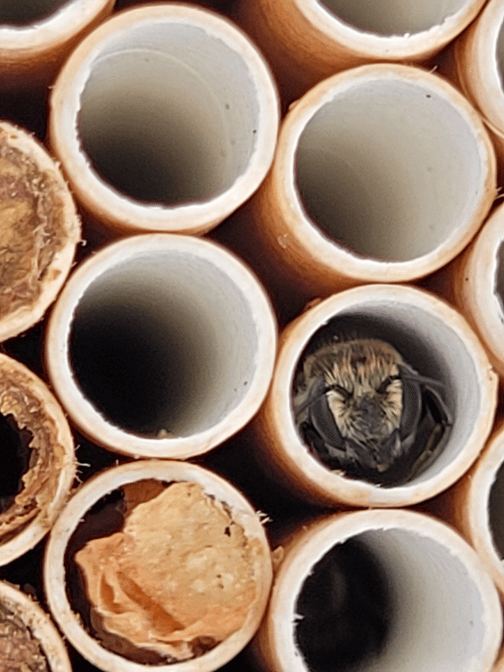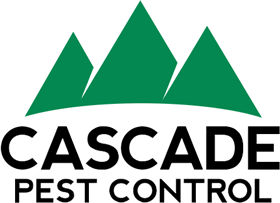Author: Kurt Treftz, Cascade Pest Control

Cascade Cultivates Pollinating Leaf-Cutting Bees
Here at our Cascade office, we have cultivated leaf-cutting bees to help enhance their species and help the local pollination process of plants.
Here is a close up of our leaf-cutting bees amongst the other tubes that either have larvae, yet to emerge, and other tubes where the bees have left some time ago.
Background on Insect Pollinators
Pollinators are a wide group of insects that visit flowering plants, helping the plants by inadvertently picking up pollen grains from the male anthers of flowers and transferring them to the female stigma of the flowers. This completes a fertilization process for the plants allowing them to produce seeds and complete their life cycle and mission of furthering the survival and hopeful expansion of their species.
In agriculture, this knowledge has led to the development of commercial beekeeping where truckloads of honey bee hives are placed amongst fields of flowering crops. There has been a very real concern around the use of insecticides because when misapplied onto flowering plants, whole hives can be destroyed.
As a result a number of legal restrictions have been put in place to protect honey bees from improper use of a pesticide. Washington State University, with which Cascade has a relationship, does extensive bee research to protect and enhance bee populations to preserve the natural bee pollination process.
While honey bees are famous pollinators, there are many other insects, and even other animals such as hummingbirds, that also pollinate flowering plants. Among the insect pollinators are beetles, flies, some wasps, and other types of bees—most notably leaf-cutting and mason bees.
Cascade’s Approach to Pest Control Keeping Pollinators in Mind
While Cascade presents itself as a ‘pest control company,’ we have a deep understanding and appreciation of insects, spiders and other species.
We know that these species only become “pests” in the context of infesting homes and such and that there are many species of ‘beneficial insects.’
In fact, we are proponents of IPM—integrated pest management—which considers the broad context of pest species and relies on a variety of control measures to mitigate the use of pest control agents.
A Word About Pest Control Products and Insect Pollinators
When it comes to controlling pests with any substance, there is a huge range of plant-derived chemicals, such as mint oils, extracts from Chrysanthemum flowers and nicotine to manufactured chemicals. Some are very low in toxicity and don’t last long in the environment while others may be more toxic and persist much longer.
What’s often missed is that you can’t easily tell whether an insecticide is toxic or not, or persistent or not simply based on whether it’s “natural.”
Naturally occurring insecticides include nicotine, which we all know is fairly toxic. And both lead and arsenic are ‘natural,’ but very toxic and extremely persistent. What’s important about pollinating insects is what can be used—on a food crop or in your garden to protect plants—that has little or no effect on them.
Cascade’s leaf-cutting bees are becoming well established and are thriving. And we are delighted! The set up for leaf-cutting bees amounts to either a series of small tubes assembled together or a wood block with multiple holes drilled in it.
In nature, leaf-cutting bees are attracted to small holes in trees—often holes left by other insects—and they lay eggs within the cavity and then collect pieces of leaves which they have “cut” into the cavity for the hatched larvae to feed on. Later they pupate within the little cavity and then emerge as adult bees, ready to begin a new life cycle.
Maintaining these bees at our office provides us amble opportunity to observe and learn from them. We ensure that every Cascade employee understands the need to recognize bee pollinators and other beneficial pollinating insects – and do our utmost to protect them.
There are kits available for raising leaf-cutting bees and we encourage others to establish small colonies of leaf-cutting bees and other related bees, such as mason bees. They are wonderful to watch, are docile and very unlikely to cause any stings, and of great benefit to your garden and neighborhood environment to ensure bee pollinators are protected.
